
Jethro Tull are a British rock band formed in Blackpool, Lancashire, in 1967. Initially playing blues rock and jazz fusion, the band later developed their sound to incorporate elements of hard rock and folk to forge a progressive rock signature. The band is led by vocalist/flautist/guitarist Ian Anderson, and has featured a revolving door of lineups through the years including significant members such as guitarists Mick Abrahams and Martin Barre, keyboardists John Evan and Dee Palmer, drummers Clive Bunker, Barriemore Barlow, and Doane Perry, and bassists Glenn Cornick, Jeffrey Hammond, John Glascock, and Dave Pegg.
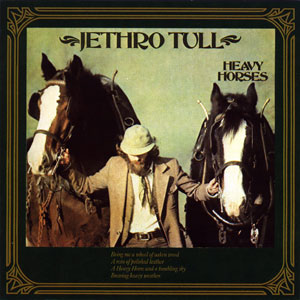
Heavy Horses is the eleventh studio album by British progressive rock band Jethro Tull, released on 10 April 1978.

A is the 13th studio album by Jethro Tull. It was released on 29 August 1980 in the UK and 1 September of the same year in the United States. The album was recorded in the summer of 1980 using Maison Rouge Mobile and Maison Rouge Studios in Fulham, London. Eddie Jobson guested on the album, playing keyboards and electric violin. The album was produced by Ian Anderson and Robin Black.
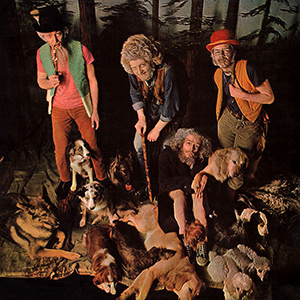
This Was is the debut studio album by the British progressive rock band Jethro Tull, released in 1968. Recorded at a cost of £1200, it is the only Jethro Tull album with guitarist Mick Abrahams, who was a major influence for the sound and music style of the band's first songs. When the album was released the band was already performing at the Marquee Club in London, where other successful British groups, such as the Rolling Stones and The Who, had started their careers.

Stand Up is the second studio album by the British rock band Jethro Tull, released in 1969. Before recordings for the album began, the band's original guitarist Mick Abrahams resigned because of musical differences with Ian Anderson; Abrahams wanted to stay with the blues rock sound of their 1968 debut, This Was, while Anderson wished to add other musical influences such as folk rock. He was replaced by guitarist Martin Barre, who appeared on every subsequent Jethro Tull album.
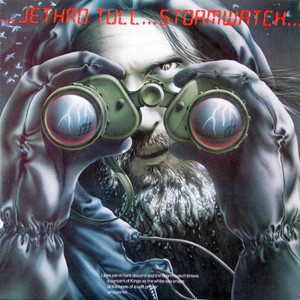
Stormwatch is the twelfth studio album by the progressive rock group Jethro Tull, released September 1979. It is considered the last in the trilogy of folk-rock albums by Jethro Tull. Among other subject-matters, the album touches heavily on the problems relating to the environment, oil and money.
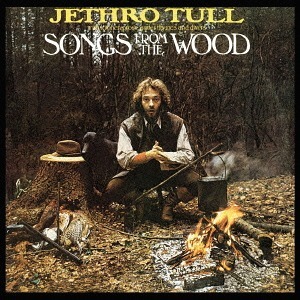
Songs from the Wood is the tenth studio album by British progressive rock band Jethro Tull, released February 1977. The album signalled a new direction for the band, who turned to celebrating British pagan folklore and the countryside life in a wide-ranging folk rock style which combined traditional instruments and melodies with hard rock drums and electric guitars.

Martin Lancelot Barre is an English rock musician best known for his work as lead guitarist with progressive rock band Jethro Tull, with whom he recorded and toured from their second album in 1969 to the band's initial dissolution in 2012. In the early 1990s he went solo, and has recorded four studio albums and made several guest appearances.
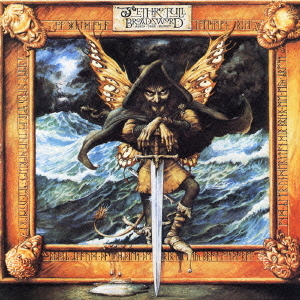
The Broadsword and the Beast is the 14th studio album by rock band Jethro Tull, released on 10 April 1982. The album is a cross between the dominant synthesizer sound of the 1980s and the folk-influenced style that Jethro Tull used in the previous decade. As such, the band's characteristic acoustic instrumentation is augmented by electronic soundscapes, provided by new keyboardist Peter-John Vettese. The electronic aspects of this album would be explored further by the band on their next release Under Wraps.

20 Years of Jethro Tull is a 1988 boxed set which spans the first twenty years of Jethro Tull. It was issued as five LPs: Radio Archives, Rare Tracks, Flawed Gems, Other Sides of Tull, and The Essential Tull. It was simultaneously released as both a 3CD and a 3-cassette set, titled 20 Years of Jethro Tull: The Definitive Collection.
"Aqualung" is a song by the British progressive rock band Jethro Tull, and the title track from their Aqualung (1971) album. The song was written by the band's frontman, Ian Anderson, and his then-wife Jennie Franks.
Clive William Bunker is a British rock drummer. He was the original drummer in the British band Jethro Tull. Never a self-professed technical drummer, Bunker engaged with the essence of blues and rock and roll, influenced by Ginger Baker and Mitch Mitchell. He was also inspired by Buddy Rich and The Hollies' Bobby Elliott.
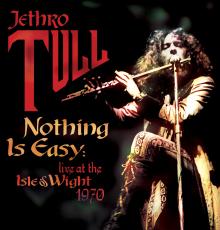
Nothing Is Easy: Live at the Isle of Wight 1970 is a live album by Jethro Tull, released on 2 November 2004. It was recorded on the fifth and last day of the Isle of Wight Festival 1970, where Jethro Tull were second on the bill between The Moody Blues and Jimi Hendrix.

John Glascock was the bass guitarist, backing vocalist, and occasional lead vocalist for the progressive rock band Carmen. He was also the bass guitarist and backing vocalist for the progressive rock band Jethro Tull from December 1975 until August 1979, and a virtuoso. He died in 1979, at the age of 28, as a result of a congenital heart valve defect, which was worsened by an infection caused by an abscessed tooth.

"Locomotive Breath" is a song by the British progressive rock band Jethro Tull from their 1971 album, Aqualung.

"World's End" is a 2008-2009 comic book crossover storyline published by Wildstorm and taking place in the Wildstorm Universe. The event takes place in the issues of all of Wildstorm's Wildstorm Universe ongoing series.
David Meade is the pen name of an American end-times conspiracy theorist and book author who has yet to disclose his real name. Meade, who describes himself as a "Christian numerologist", claims to have attended the University of Louisville, where he "studied astronomy, among other subjects", but, because his real name is unknown, The Washington Post reported that the university could not confirm whether he had ever been a student there. He is also a writer, researcher and investigator who has written and self-published at least 13 books. He made appearances and interviews on Coast to Coast AM, The Washington Post, Glenn Beck Program, YouTube with pastor Paul Begley, and the Daily Express. He is best known for making numerous failed predictions, which have passed, regarding the end times, including that a hidden planet named Nibiru would destroy the Earth.













